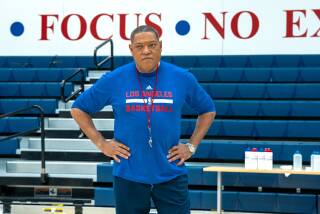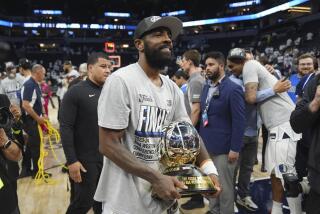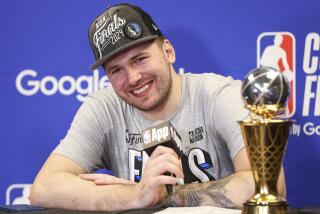Harper’s Bizarre Trek to New York : NBA finals: Languishing in Dallas, guard gets chance with Knicks only after friend’s injury.
- Share via
NEW YORK — It was perhaps the only thing worse than being a Dallas Maverick. Being a Dallas Maverick with the tease of parole, a trade, always around. It was cruel.
That he was the one left to go down with the ship, while Rolando Blackman and Sam Perkins and Detlef Schrempf were on teams challenging for an NBA title, only compounded the anguish for Derek Harper. He was one of the most popular Mavericks ever and had enjoyed many great times there, but the implosion of the once-promising franchise left him aching to join the others who got out, even somewhat jealous of the June 1992 trade that had sent longtime backcourt mate Blackman to New York. The final days of his career were flying by as a 32-year-old mentor on a team so deep in a youth movement that it would contend for the worst record in league history two years in a row.
Then it came, after so much wishing. Doc Rivers suffered a season-ending knee injury and the Knicks, the same team that rescued Blackman, needed a new starting point guard, preferably a stable influence to offset backup Greg Anthony, who could play a much faster pace but too often as if on a perpetual sugar rush. Harper knew almost the instant he heard of Rivers’ plight that this could be his opportunity.
“I never had doubts,” he said.
The trade was completed Jan. 6, with the Mavericks getting free-agent-to-be Tony Campbell because they wanted his salary slot in the summer and a future first-round pick. Harper couldn’t have dreamed for more--he got out of Dallas and landed on a team that would eventually play for the title.
His thank-yous haven’t stopped since. The biggest came Friday night, when he made seven of 11 shots, including four of six three-pointers, to contribute 18 points and seven assists to the Knicks’ 91-83 victory in Houston that evened the best-of-seven series with the Rockets heading into Game 3 tonight at Madison Square Garden. At the same time, his defense hounded counterpart Kenny Smith into a second consecutive unspectacular showing.
“I think that in order to gain something good you have to go through a little transition, a little down, a little bad,” Harper said. “And I went through a lot of bad my last two years, and this is what has come out of it. I think it was worth it.”
Fate said he would get this chance, for he and Rivers had always been linked, since the very beginning. They were born on the same day, after all, Oct. 13, 1961. They met at a summer all-star camp in high school and then were compared as seniors in the rankings for the best guards in the country. They made a pact to attend the same college and might have both ended up at Michigan until Johnny Orr left as coach and Harper opted for Illinois and Rivers chose Marquette. They got the same agent, George Andrews, and watched the 1983 draft together, just the two of them alone in Andrews’ apartment as he attended the proceedings in New York, living the excitement of Harper going No. 11 to Dallas and the disappointment of Rivers dropping into the second round before being picked by Atlanta.
So perhaps it was inevitable that Harper’s journey from the worst to one of the best would be tied to Rivers. The only bad part is that it came at the expense of Rivers, who, like Harper, waited his entire career for a chance to play in the finals and even came close once while with the Hawks. And now, when that opportunity should be there, after he had used that chance to counter the disappointment of leaving Los Angeles when traded by the Clippers, he is relegated to the sidelines.
Rivers participates only as a cheerleader. He doesn’t go to many practices during the playoffs because he doesn’t want to feel the buildup to the games, especially in the championship series, and then not be able to take part.
He says his wife isn’t watching the finals on television because it hurts her too much, and later she doesn’t even want to talk about the games. The only comforting part has been the teammates who try to make him feel he had a hand in this, like Blackman’s recent reminder that Rivers hit two-game winning shots during the 19 outings before the injury and that the Knicks might not have had home-court advantage in the playoffs against Chicago without him.
“I’d be a liar if I said winning a world championship will feel just like I thought it would,” Rivers said. “But it won’t. It will be nice if and when we win, but it won’t be the same.”
Harper, meanwhile, is basking.
“After going through all of the things that I’ve gone through to get to this point, I definitely appreciate it,” he said. “But I don’t think appreciating it is going to be enough. The bottom line is to try to take full advantage of it by winning it all. We don’t just want to be here. We are here and we’re here to win.”
Now they are here, as in Madison Square Garden, with a chance to win the series at home. The Knicks are 9-1 there during the playoffs, but even coming back to play the next three games after stealing home-court advantage in Houston doesn’t guarantee much.
Two other teams were in the same situation in the four previous finals, and both got swept at home to lose the title. It happened when the Trail Blazers split at Detroit in 1990 and then lost the next three in Portland, a feat duplicated the next year as the Bulls won all three games at the Forum after losing home-court advantage to the Lakers in Chicago.
More to Read
Go beyond the scoreboard
Get the latest on L.A.'s teams in the daily Sports Report newsletter.
You may occasionally receive promotional content from the Los Angeles Times.










